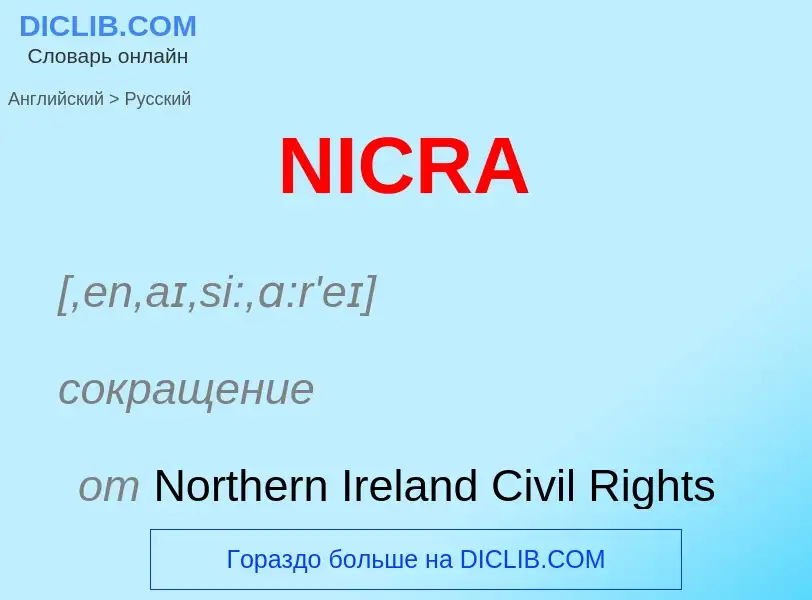ترجمة وتحليل الكلمات عن طريق الذكاء الاصطناعي ChatGPT
في هذه الصفحة يمكنك الحصول على تحليل مفصل لكلمة أو عبارة باستخدام أفضل تقنيات الذكاء الاصطناعي المتوفرة اليوم:
- كيف يتم استخدام الكلمة في اللغة
- تردد الكلمة
- ما إذا كانت الكلمة تستخدم في كثير من الأحيان في اللغة المنطوقة أو المكتوبة
- خيارات الترجمة إلى الروسية أو الإسبانية، على التوالي
- أمثلة على استخدام الكلمة (عدة عبارات مع الترجمة)
- أصل الكلمة
NICRA - ترجمة إلى الروسية
[,en,aɪ,si:,ɑ:r'eɪ]
сокращение
от Northern Ireland Civil Rights Association
ويكيبيديا
The Northern Ireland Civil Rights Association (NICRA) (Irish: Cumann Cearta Sibhialta Thuaisceart Éireann) was an organisation that campaigned for civil rights in Northern Ireland during the late 1960s and early 1970s. Formed in Belfast on 9 April 1967, the civil rights campaign attempted to achieve reform by publicising, documenting, and lobbying for an end to discrimination against Catholics in areas such as elections (which were subject to gerrymandering and property requirements), discrimination in employment, in public housing and abuses of the Special Powers Act.
The genesis of the organisation lay in the emergence of a more self-confident Catholic professional middle class who, following the example of the US civil rights movement, campaigned for equal rights and reform. The Campaign for Social Justice was formed in January 1964.
A younger generation of left-wing radicals inspired by the 1960's wave of worker and student militancy across Europe was also ready to take to the street to protest. They would go on to form People’s Democracy in 1968.
The failure of the 1956-62 IRA border campaign encouraged Republicans to prioritise radical popular street campaigns rather than rely on traditional physical force tactics. In this rethink of Republican strategy a key meeting took place in Maghera in August 1966 between the Wolfe Tone Societies which was attended by Cathal Goulding, then chief of staff of the Irish Republican Army (IRA).
During its formation, NICRA's membership extended to trade unionists, communists, liberals, socialists, with republicans eventually constituting five of the 13 members of its executive council. The organisation initially also had some unionists, with Young Unionist Robin Cole taking a position on its executive council. Official Sinn Féin and Official IRA influence over NICRA grew in later years, but only as the latter's importance declined, when violence escalated between late 1969 until 1972, when NICRA ceased its work.

